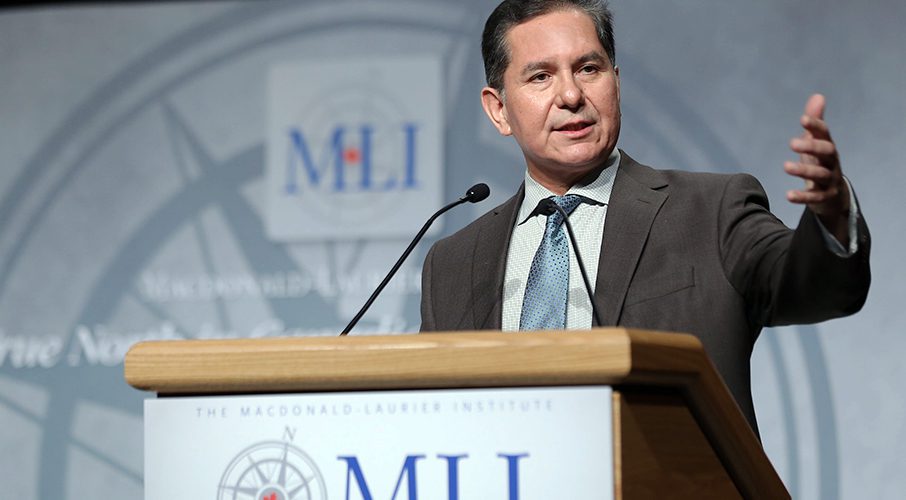
To be serious economic players and achieve true reconciliation, Indigenous communities and businesses need access to opportunity, write Sharleen Gale and Joseph Quesnel.
By Sharleen Gale and Joseph Quesnel, September 10, 2019
As a federal election looms, all major parties have discussed the need for reconciliation with Indigenous peoples in one way or another. While Canadians see the pressing need to improve the living conditions in Indigenous communities, many are cautious about Indigenous reconciliation and what exactly it entails.
Though the concept defies single definition, Canadians need not fear reconciliation, as it will benefit all communities, not just Indigenous ones.
This February, the Macdonald-Laurier Institute hosted its annual dinner in Ottawa around the theme of economic reconciliation with Indigenous peoples. One keynote speaker, Indigenous business leader Blaine Favel, addressed reconciliation.
“Reconciliation means that Indigenous people should not be the poorest people in lands that belong to us,” he said.
For Favel, governments in Canada miss the full picture when it comes to Indigenous economic opportunity. Rather than viewing First Nations as willing partners, they are too often seen as another box to check.
Governments must recognize that economic inclusion of First Nations as partners in resource development is in the national interest, and indeed, the interests of all parties.
When a First Nation can access economic opportunities, so do nearby non-Indigenous municipalities. Not only are Indigenous communities able to hire their members and provide jobs within their territories, they also hire many non-Indigenous residents. There is a strong ripple effect.
When a First Nation is economically sustainable, its members have more funds to purchase goods locally and these are not just limited to the necessities. First Nations also tend to support local businesses, helping family owned stores in nearby communities remain open.
The money First Nations make by being involved in major projects creates local opportunities for everyone because First Nations are not going anywhere and will always require these types of services, regardless of external circumstances.
There still exists a stigma that First Nation people cannot look after themselves. This is untrue. They simply need the opportunity to be successful, the same opportunities other business owners take for granted, including access to markets and financing. It’s one reason why many well-educated Indigenous people are working outside their home communities — there is no opportunity at home.
To be serious economic players and achieve true reconciliation, Indigenous communities and businesses need the proper levers. First Nations must have access to capital at competitive rates. This remains a barrier for participation in large-scale infrastructure projects as equity owners. Indigenous people have demonstrated a level of business sophistication necessary to play a serious role at the project negotiation table by advancing Indigenous interests in these projects.
While many hurdles have been overcome, access to affordable capital remains the paramount challenge to meaningful inclusion.
Government has a role in responding innovatively to these challenges. Legislative and policy frameworks exist to enable backstopped financing to be made available through government guarantees for a variety of priority projects deemed to be in the interest of the national and provincial economies.
However, the need to build First Nation communities’ infrastructure cannot be satisfied solely by federal funding. First Nations having these opportunities will ensure their members and children have a better chance to succeed with better access to education, health care and wellness. This will allow them to build stronger, healthier communities.
This is the kind of reconciliation Blaine Favel was speaking about.
This is the kind of work that many inspiring First Nation leaders are leading. For example, Indigenous leaders who are members of the First Nations Major Projects Coalition are working alongside their communities to pursue equity positions in major projects.
By empowering First Nation communities and their members to run their own businesses and hire their own Indigenous professionals, this will create a partnership between First Nations and nearby non-Indigenous communities. This partnership is past due and will be beneficial to all Canadians. This is the kind of reconciliation we can all be proud of.
Sharleen Gale is a senior fellow with the Macdonald-Laurier Institute, chair of the First Nations Major Projects Coalition and the Chief of the Fort Nelson First Nation. Joseph Quesnel is program manager of the Macdonald-Laurier Institute’s Aboriginal Canada and the Natural Resource Economy (ACNRE) project.




